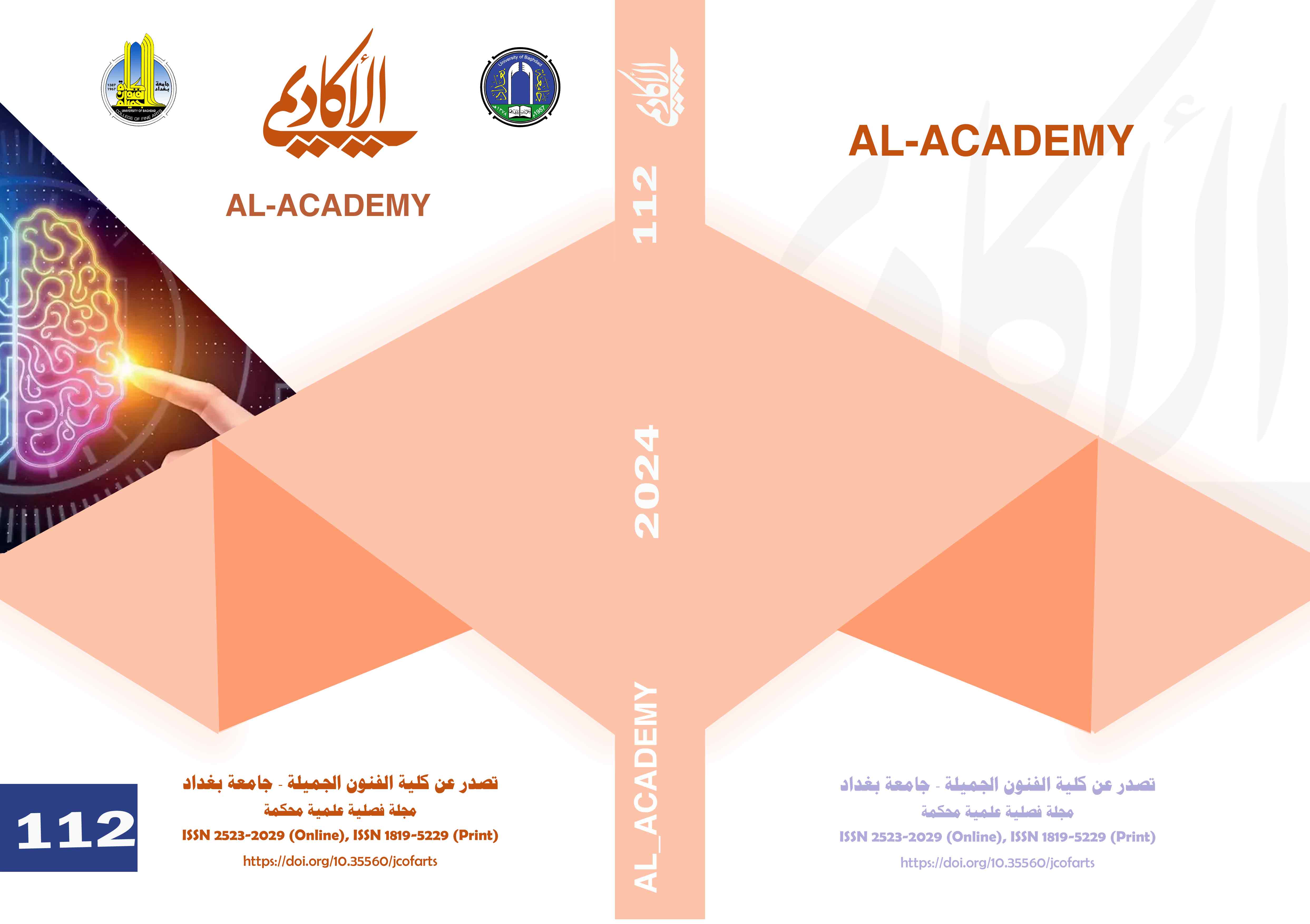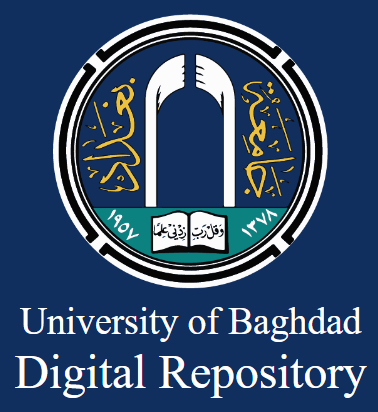Stereotyping and its manifestations in the theater of Eugene Ionesco
DOI:
https://doi.org/10.35560/jcofarts1377Keywords:
Manifestations Stereotyping theater of the absurdAbstract
There is a class or group of people who share characteristics, methods, and methods of a type or style, even if they differ from each other in their divisions with these characteristics, that is, a template and model that defines certain images and things. The current research is divided into three chapters. The first chapter deals with the research problem, which is represented by the following question: “ What are the manifestations of stereotyping in the theater (Eugène Ionesco), then the importance of research and the need for it as it benefits scholars and workers in the field of theater, and then the goal of the research (learn about planning and its manifestations in the theater (Eugène Ionesco), and then the temporal limits of the period (1950-1955) And spatial (Romania) and objectivity, a study of stereotyping and its manifestations in the theater of Eugene Ionesco. The second chapter contained the theoretical framework and included three topics. The first topic was concerned with stereotyping conceptually, while the second topic was stereotyping socially. The third topic dealt with the features of stereotyping in the theatrical text. The third chapter was represented by research procedures and included society. The research included (8) theatrical texts, and then the research sample was chosen intentionally (the bald singer, the new tenant). The research relied on the descriptive approach in the analytical method, and the research concluded with the fourth chapter, including the results, conclusions, and a list of sources
References
Ahmed Mukhtar Omar, (2008) Dictionary of the Contemporary Arabic Language, vol. 1, 1st edition, Cairo: Alam al-Kutub, p. 2286.
Zain al-Abidin Abu Abdullah Muhammad bin Abi Bakr al-Razi (1957), Mukhtar al-Sihah, Beirut: Publishing House, p. 283.
Mahmoud Rashad Al-Khamrawi(1955), The Arabic Methodology for Establishing Terminology from Monotheism to Standardization, Riyadh: King Fahd Library, p. 42.
john itarding (1968) "stereo type in international encyclopedia of the social sciences, vol. 4, new york: macmillian company the free press, , P. 259.
H.C.J Duijker and N.H. Fridje, (1961) National character and National stereo type amesterdam: north- Holl and publishing co, , P. 115.
Muhammad al-Nakhlawi: (2008) Approaches and Research on Comparative Procrastination Beirut: Dar al-Talaba, ed. p. 153.
Sabri Muhammad Khalil (1883) The Philosophy of Islamic Values, University of Khartoum, Emir Abdul Qadir Jamah Hasiba bin Bu Ali Al-Talf, Algeria, 1807, p. 58.
Hamad Anani, Terminology (1996), Modern Literature, 1st edition, Lebanon: Lebanon Publishers Library, p. 154.
Abd al-Nabi bin Abd al-Rasul al-Ahmad Fikri (1975) Jami’ al-Ulum fi Terminology of the Arts, nicknamed the Constitution of the Scholars, vol. 1, 2nd edition, Beirut: Al-Alami Publications Foundation, p. 275.
Abdul Wahab Al-Mesiri: (2002) Partial Secularism and Comprehensive Secularism, vol. 1, 1st edition, Cairo: Dar Al-Shorouk, p. 179.
Barakat and Muhammad Murad: (2009) Globalization and the Crushing of Cultural Identities, Jadal Magazine, No. (11), Baghdad: Jadal Cultural Center, p. 13.
Muhammad Safouh Al-Akhras: (1997) A Model of Social Pattern Strategy in Arab Countries, 1st edition, (Riyadh: King Nahad Library), , p. 125.
Jean Cazeneuve: Foundations of Sociology, Trans.: (1989) Adel Al-Awa, 1st edition, (Damascus: Talas House for Studies and Publishing, p. 180.
Emile Durkheim: Rules of Method in Sociology, Trans.: (1950), Mahmoud Qasim, (Cairo: Egyptian Nahda Library, p. 131.
Aristophanes: The Frogs, Trans.: (2012), Abdel Muti Shaarawi, p. 358, (Kuwait: National Council for Culture, Arts and Literature, , p. 83).
Sophie Trudel, The Human Machine, Trans.: (1958), Anwar Al-Ashry, (Egypt: Misr Library, pp. 10-11.
Alfred Faraj: (1986) Letters of the Judge of Seville and the Barber of Baghdad, (Cairo: Dar Al-Hilal,), p. 91.
Qahtan Jassim Jawad, Taha Salem, (2018) Pioneer of the Theater of the Absurd in Iraq, no. 2338, (Iraq: Baghdad, p. 282.
Ali Muhammad Hadi, Amer Sabah Al-Marzouqi: (2018) , The Iraqi Theater, (Babylon - Dar Al-Riyadi for Publishing and Distribution,), p. 51.
Muayyad Daoud Al-Bassam, Taha Salem’s (2015), 2nd edition, vol. 1, (Baghdad: Dar Al-Shahd Printing, p. 77.
Taha Salem, (1995), Tantal, typewritten, Baghdad, p. 16.
Munir Al-Baalji: (1990), Al-Mawrid, (Beirut: Dar Al-Ilm Lil-Millain , p. 21.
Sneshina Yanotha: Theory of Drama, Trans.: (2009), Nour al-Din Faris, 1st edition, Baghdad: House of Cultural Affairs, p. 207.
Muhammad Ghoneimi Hilal: (1964), Modern Literary Criticism, 3rd edition, (Cairo: Dar Al-Shaab, p. 678.
The Life of Jassim Muhammad: (1983), Experimental Drama in Egypt and the Western Influence on it, Beirut: Dar Al-Adab Publications, p. 126.
Eugene UNESCO: (2006), The Complete Works of UNESCO, Part 1, Trans. Hamada Ibrahim, Egypt: Egyptian General Book Authority, p., p. 27.
Eugene UNESCO: (2006), The Complete Works of UNESCO, Part 1, Trans. Hamada Ibrahim, (Egypt: Egyptian General Book Authority, p.), p. 47.
Eugene UNESCO: (2006), The Complete Works of UNESCO, Part 1, Trans. Hamada Ibrahim, Egypt: Egyptian General Book Authority, p., p. 48.
Eugene UNESCO: (2006), The Complete Works of UNESCO, vol. 1, trans. Hamada Ibrahim, Egypt: Egyptian General Book Authority, p. 35
Downloads
Published
Issue
Section
License
Copyright (c) 2024 Aseel Abdel-Khaleq

This work is licensed under a Creative Commons Attribution 4.0 International License.













